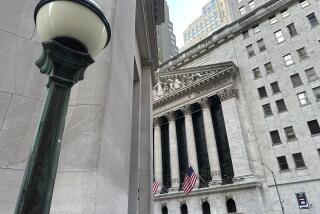FINANCIAL MARKETS : Bond Yields Up, Dollar Down on 7th Fed Increase
The Federal Reserve Board’s decision to move interest rates higher for a seventh time in 12 months sent bond yields up and the dollar lower Wednesday but had little effect on the stock market, which inched higher.
The Treasury’s benchmark 30-year bond yield rose to 7.74% from Tuesday’s four-month low of 7.69%. Shorter-term yields also rose, with the two-year Treasury note yield ending at 7.36%, up from 7.24% on Tuesday.
Market participants said Treasury yields shot up after the Fed increased its discount rate, the interest the bank charges on direct loans to commercial banks, to 5.25% from 4.75%. It also increased its target for the more important federal funds rate, the interest that banks charge each other, by half a point to 6%.
The Fed’s policy-making Open Market Committee also issued a statement that said signs of a slowdown in the economy were only tentative.
The announcement spurred some investors to sell bonds, on the assumption that the Fed is leaving the door open for further interest rate hikes this spring or summer.
Many bond traders have been hoping that the Fed was nearly finished with its credit-tightening cycle, after raising short-term rates 3 percentage points over the past 12 months.
A weakening in the dollar against major foreign currencies after the Fed raised interest rates also caused the bond market to react negatively, said Steven R. Ricchiuto, chief economist with Barclays de Zoete Wedd Government Securities Inc.
Normally the dollar would be expected to strengthen on news of higher interest rates. But the dollar fell to 99.25 Japanese yen in New York from 99.63 yen Tuesday. The dollar also changed hands at 1.519 German marks, down from 1.525 on Tuesday.
Traders said doubts about the effectiveness of President Clinton’s re-cobbled bailout plan for Mexico also weighed on the dollar.
Some analysts, however, said the selloffs in the bond market and in the dollar simply reflected profit-taking. Bonds in particular have been rallying in recent weeks, driving yields lower.
Bonds also may have been hurt by the Treasury’s announcement Wednesday of the sale of $40 billion in three-, 10- and 30-year bonds next week.
“The market had taken . . . bonds to an unsustainable level,” said Elena Shperling, chief trader at the New York branch of Banco di Sicilia, an Italian bank. “Now all of a sudden the realization is coming that the Fed isn’t done.”
Meanwhile, on Wall Street, the Dow Jones industrial average managed to rise despite the drop in bond prices, adding 3.70 points to 3,847.56.
The blue-chip index rose as much as 26 points early in the session before fading.
Still, in the broader market, advancing issues led declines by about 4 to 3 on the Big Board, where volume totaled a heavy 395.32 million shares--swelled by trading in U.S.-listed Latin American stocks.
Traders said the stock market may be exhibiting more faith than the bond market that the Fed is almost finished raising rates, and that the economy will slow without going into recession.
Among Wednesday’s highlights:
* The Dow was led higher by a rebound in industrial issues that had been hit by profit-takers in recent days. Winners included Alcoa, up 1 3/4 to 80 3/8; IBM, up 1 1/2 to 73 5/8, and Boeing, up 1 3/8 to 45 7/8.
* Also among industrial names, Ford Motor slipped 1/8 to 25 1/8 after rising earlier on its report of sharply higher fourth-quarter profits.
* Many so-called defensive stocks--those of drugs, food and other consumer product companies--fell after surging on Friday and Monday. These stocks often rise when investors believe higher interest rates will lead to a slowdown in the economy.
Procter & Gamble fell 1 1/4 to 63 7/8, 3M lost 1 3/8 to 51 and Eastman Kodak slid 1 3/8 to 47 5/8.
* Athletic shoe maker Reebok International lost 2 3/4 to 35 1/4 after its fourth-quarter profits came in below analysts’ forecasts.
* Most Mexican stocks pulled back on profit taking after soaring Tuesday on news of the aid package for the battered Mexican economy. Telmex fell 1 1/8 to 34 1/4 and Televisa slipped 1 to 23.
Mexico City’s Bolsa stock index fell 96.19 points to 1,997.79 as investors took profits following the previous day’s euphoric rally.
Meanwhile, other overseas stocks closed higher with Tokyo’s 225-share Nikkei average index gained 89.65 points to close at 18,739.47. Frankfurt’s 30-share DAX average ended up 27.16 at 2,048.43 and London’s Financial Times 100-share average rose 25.7 points to 3,017.3.
More to Read
Inside the business of entertainment
The Wide Shot brings you news, analysis and insights on everything from streaming wars to production — and what it all means for the future.
You may occasionally receive promotional content from the Los Angeles Times.










